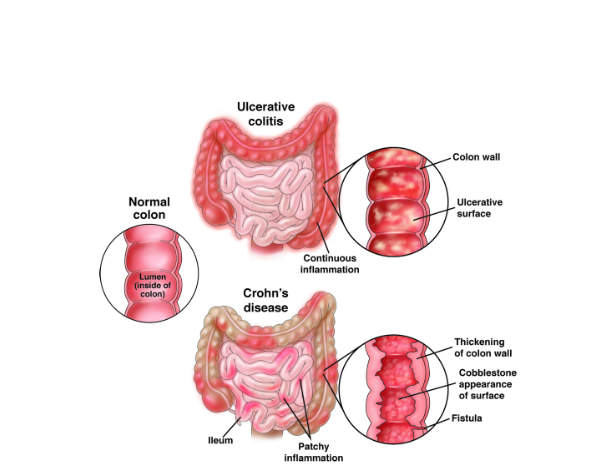Oleh: Thalia Kaylyn Averil
Inflammatory Bowel Disease (IBD) atau penyakit radang usus adalah sekelompok penyakit yang ditandai dengan peradangan pada saluran pencernaan. IBD terjadi karena adanya proses inflamasi berulang di usus yang dipicu oleh respon imun abnormal terhadap bakteri yang normalnya berada di saluran pencernaan. IBD dapat dibedakan menjadi tiga jenis berdasarkan lokalisasi dan kedalaman keterlibatan di dinding usus, yaitu kolitis ulseratif, penyakit Crohn, dan indeterminate colitis jika sulit membedakan antara kolitis ulseratif dan penyakit Crohn. Pada kolitis ulseratif, terjadi peradangan yang menyebar secara difus pada mukosa kolon atau usus besar. Kolitis ulseratif umumnya terjadi di rektum dan dapat berlanjut ke bagian atas, seperti sigmoid (bagian akhir dari usus besar) atau bahkan ke sekum (bagian awal dari usus besar) yang ditandai dengan pankolitis, yaitu radang yang terjadi di seluruh bagian dari usus besar. Di lain sisi, penyakit Crohn dapat menyebabkan ulserasi pada seluruh saluran pencernaan. Namun, penyakit ini paling sering menyerang ileum terminal (bagian akhir dari usus halus) dan usus besar.
Sistem kekebalan di usus berperan penting dalam menyebabkan terjadinya IBD. Lapisan usus bertindak sebagai protektor yang dapat mencegah masuknya zat berbahaya, seperti bakteri atau antigen, memasuki aliran darah. Pada IBD, sistem proteksi ini melemah karena peradangan parah sehingga tidak dapat berfungsi dengan baik. Tubuh juga memiliki sistem pertahanan lain, yaitu lendir yang diproduksi oleh sel-sel di saluran pencernaan dan pelepasan zat antimikroba. Namun, reaksi peradangan yang berlebihan menyebabkan lapisan usus semakin rusak, ditambah dengan adanya paparan terhadap mikroba usus sehingga dapat memperburuk peradangan.
Pada kolitis ulseratif, terjadi peradangan terus-menerus pada lapisan di usus besar dan rektum yang menyebabkan pembengkakan, bisul, pendarahan, dan hilangnya elektrolit. Di sisi lain, penyakit Crohn dapat menyerang bagian mana pun dari saluran pencernaan sehingga dapat menyebabkan penyempitan, peradangan, atau pembentukan saluran yang tidak normal. Jika penyakit ini menjadi kronik, usus besar dapat menjadi kaku dan pendek sehingga kehilangan tampak normalnya. Kolitis ulseratif dapat menyebabkan masalah di luar usus, seperti masalah kulit, mata, dan tulang, sedangkan penyakit Crohn sebagian besar mempengaruhi usus besar, tetapi juga dapat melibatkan bagian lain. Kedua kondisi tersebut dapat menyebabkan komplikasi berupa radang pada daerah sendi dan mata. Pada kolitis ulseratif, terdapat risiko lebih tinggi terkena penyakit ginjal dan batu empedu karena buruknya penyerapan zat tertentu.

Gambar 1. Kolitis ulseratif dan penyakit Crohn.
IBD sering muncul sebagai diare kronis, dengan atau tanpa darah, yang disertai dengan adanya nyeri perut. Pasien IBD juga mungkin mengalami masalah di luar usus. IBD dapat dibagi menjadi dua fase, yaitu fase remisi dan fase aktif. Fase remisi disebabkan oleh pengobatan atau pemulihan yang terjadi secara spontan. Pada kolitis ulseratif, gejala bisa dimulai dengan gejala yang parah atau gejala ringan yang memburuk secara bertahap. Tingkat keparahan seringkali dipengaruhi oleh bagian usus besar yang terkena. Pada penyakit Crohn, selain gejala umum, adanya fistula atau saluran abnormal adalah ciri khas utamanya. Nyeri perut akan lebih terasa pada pasien dengan penyakit Crohn karena lesinya mempengaruhi seluruh bagian dinding usus sehingga dapat menyebabkan fistula, penyumbatan, dan pertumbuhan bakteri yang berlebihan.
Diagnosis IBD dapat dilakukan dengan langkah-langkah berikut:
- Menanyakan riwayat medis, seperti ada tidaknya diare yang berulang, diare yang disertai dengan darah, atau sakit perut. Selain itu, penting juga untuk mengetahui riwayat penyakit dalam keluarga.
- Tenaga kesehatan juga akan melakukan pemeriksaan fisik berupa keadaan umum, status nutrisi, dan nyeri tekan pada perut.
- Pemeriksaan laboratorium berfungsi untuk menyingkirkan penyebab peradangan lainnya, terutama infeksi saluran cerna yang umum terjadi di Indonesia. Selain itu, penting juga untuk eksklusi penyakit tuberkulosis karena gejalanya mirip dengan penyakit Crohn. Pemeriksaan laboratorium yang dapat dilakukan adalah pemeriksaan darah lengkap, feses, laju endap darah sebagai penanda peradangan, dan C-reactive protein, yaitu protein yang dihasilkan oleh hati sebagai respons peradangan. Gastrointestinal pathogen panel atau panel patogen gastrointestinal adalah salah satu contoh pemeriksaan menggunakan feses yang dapat dilakukan untuk mendeteksi mikroorganisme penyebab infeksi pada saluran pencernaan.
- Pemeriksaan endoskopi, patologi, dan radiologi juga dapat dilakukan sebagai salah satu cara untuk diagnosis IBD. Pemeriksaan radiologi dapat berupa foto polos abdomen, barium kontras ganda, CT scan, dan USG. Pemeriksaan endoskopi memainkan peran yang sangat penting dalam diagnosis IBD dengan akurasi diagnostik sebesar 89%. Endoskopi dapat dilakukan untuk deteksi dini IBD sehingga pasien mendapatkan pengobatan tepat waktu yang berpotensi meningkatkan prognosis pasien IBD.
- Tenaga kesehatan akan memantau kondisi pasien dari waktu ke waktu.
Referensi:
- Braunwald E, Fauci AS, Kasper DL, Hauser SL, Longo PL, Jameson JL. Harrison’s principles of internal medicine. 19th ed. New York: McGraw-Hill; 2015.
- Setiati S, Alwi I, Sudoyo AW, Simadibrata M, Setiyohadi B, Syam AF, editor. Buku ajar ilmu penyakit dalam. 6th ed. Jakarta: Interna Publishing; 2014.
- McDowell C, Farooq U, Haseeb M. Inflammatory Bowel Disease. [Updated 2023 Aug 4]. In: StatPearls [Internet]. Treasure Island (FL): StatPearls Publishing; 2024 Jan-. Available from: https://www.ncbi.nlm.nih.gov/books/NBK470312/
- American Gastroenterological Association. Inflammatory bowel disease (IBD) [Internet]. Bethesda: AGA GI Patient Center; date of publication unknown [cited 2024 Apr 5]. Available from: https://patient.gastro.org/inflammatory-bowel-disease-ibd/
